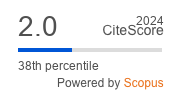Retrospective Evaluation of the Diagnostic Accuracy of the Modified Alvarado Scoring System (MASS) in a Croatian Hospital
DOI:
https://doi.org/10.5644/ama2006-124.256Keywords:
Acute Appendicitis, Diagnostic Accuracy, Modified Alvarado Scoring System (MASS)Abstract
Objective. Diagnosing acute appendicitis (AA) is challenging and this has stimulated surgeons to develop scoring systems that could potentially decrease the rate of misdiagnosis in patients with suspected appendicitis. One of the most widely used today is the Modified Alvarado scoring system (MASS), however its sensitivity and specificity varies a great deal between studies. As a result, we wanted to assess the diagnostic accuracy of MASS retrospectively at our institution to achieve the highest possible value of sensitivity and decrease the number of false negative patients.
Material and Methods. We retrospectively calculated MASS for all subsequent patients who had undergone an appendectomy at our institution between July 2015 and March 2017.
Results. In 118 out of 146 operated patients, AA was confirmed intraoperatively. There was a statistically significant difference between the average MASS score in the positive and negative appendectomy groups (6 v. 4, respectively, P<0.001), with a significantly higher number of females among the negative appendectomies (P<0.001). When lowering the cut-off to a value as low as ≥3, the sensitivity of the MASS score increased to 97.45% (95% CI: 92.7 – 99.5), thus obtaining a very low false negative rate of merely 2.55%.
Conclusion. This retrospective diagnostic accuracy study confirmed the higher average MASS score in the group of patients with confirmed AA diagnosis. A MASS score above the proposed low cut-off value (≥3) can be a useful tool to help surgeons ruling in patients with AA in order to reduce the risk of missing diagnosis.





